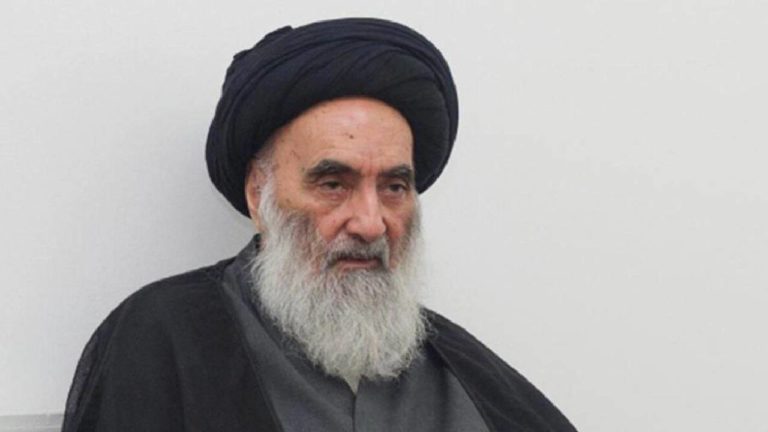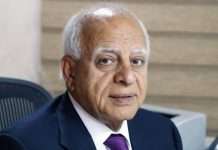The Sistani Message: A Final Cry to Save the ‘Lebanese Shiites’ from the Clutches of Iranian Exploitation
Janoubia Website/November 27/2025 (Free translaion from Arabic by: Elias Bejjani)
«رسالة السيستاني» صرخة أخيرة لإنقاذ «شيعة لبنان» من براثن الاستغلال الإيراني
موقع جنوبية/27 تشرين الثاني/2025
يواجه لبنان أزمة وجودية متعددة الأوجه، وتبرز قضية “الاستغلال الإيراني” للبيئة الشيعية في كواحدة من أكثر العوائق تعقيداً أمام استعادة الدولة لسيادتها ووحدتها الوطنية. فبينما يتم تقديم العلاقات الإيرانية للبنان على أنها “دعم المقاومة”، تأخذ هذه العلاقة شكلا من أشكال النفوذ والسيطرة الإيرانية على الشيعة في لبنان، وشكلا من أشكال الاحتواء السياسي والاقتصادي والعسكري لطائفة لبنانية عريقة، وتحويل ولائها من الدولة اللبنانية إلى مشروع إقليمي لا يخدم سوى أجندات إيرانية. وجاءت التصريحات الأخيرة لعلي ولايتي مستشار المرشد الإيراني لتؤكد استمرار طهران بالاستغلال السياسي للشيعة في لبنان تحت مسمى “دعم المقاومة” وحزب الله، وقال ولايتي في تصريحه الأخير أنّ وجود حزب الله في لبنان “لا غنى عنه” لمواجهة الاعتداءات الإسرائيلية. وأضاف: “إنّ وجود الحزب بالنسبة للبنان بات اليوم “أكثر ضرورة من الماء والخبز”، معتبرًا أنّ الحزب كان “منقذًا للشعب اللبناني” في محطات أساسية”. هذه التصريحات وما سبقها من تحريض لحزب الله على الرد على اغتيال هيثم الطبطبائي، تؤكد استمرار طهران في مسارها الخطير بتوريط الشيعة في لبنان بالمزيد من الخيارات المدمرة، في وقت ما زالت الطائفة الشيعية تدفع قيمة الفواتير الباهظة لـ”حرب الإسناد” و “وحدة الساحات”، فيما وقفت إيران متفرجة على الدم الشيعي طوال عام من الحرب التي لم تنته باغتيال الأمين العام السابق لحزب الله السيد حسن نصر الله فحسب، بل استمرت وتستمر حتى اليوم.
جذور التبعية وتكريس “الدويلة”
منذ تأسيس حزب الله بدعم إيراني في ثمانينات القرن الماضي، نجحت طهران في بناء “أداة” محلية تُدير عبرها نفوذها في لبنان. هذا النفوذ تجاوز الدعم المالي واللوجستي ليصبح سيطرة شبه كاملة على القرار السياسي والأمني والاقتصادي للطائفة الشيعية، ولسيادة الدولة اللبنانية ككل.
السيطرة الشامل
عمل الحزب، بتمويل إيراني، على بناء مؤسسات موازية للدولة، تشمل شبكات اجتماعية، صحية، تعليمية، وبنية عسكرية قوية تفوق قدرة الجيش اللبناني.
هذا النظام الموازي جعل قطاعاً واسعاً من المجتمع الشيعي يعتمد على هذا النفوذ لتأمين مقومات حياته، مما يعزز الولاء للجهة الممولة (إيران وحزب الله) على حساب الدولة اللبنانية.
تغييب الصوت المعارض
يسود اعتقاد بأن الخطاب السياسي والإعلامي داخل هذه البيئة أصبح موجّهاً بحيث لا يتيح مساحة كبيرة للنقد أو المعارضة الجدية للقرار الإيراني، ويتم شيطنة أي صوت شيعي وطني يطالب بالحياد والسيادة اللبنانية.
استنزاف الأجيال
وطالما جرى ومنذ عقود توظيف البيئة الشيعية في صراعات إقليمية (كالحرب في سوريا)، وتحويل أبنائها إلى “وقود” لأهداف إيرانية، وهي لم تكن يوما في مصلحة الطائفة بل جعلت من الطائفة الشيعية في لبنان مكونا بعيدا عن الدولة اللبنانية، والمصالح الوطنية للبنان.
التحرر من هذا الاستغلال؟ إن التحرر من هذا النفوذ ليس مهمة سهلة، مع الإصرار الإيراني من جهة، ومع إصرار حزب الله على التبعية لإيران من جهة ثانية، ولا شك أن الخروج من المستنقع الإيراني يتطلب مساراً متعدد الأوجه يجمع بين الضغط الخارجي والإرادة الداخلية وتفعيل أدوات الصوت الشيعي “الوطني” الذي يؤمن بالسيادة اللبنانية الكاملة والحياد، ورفض التبعية الإيرانية، والانتماء للدولة اللبنانية وحدها. كما لا يمكن تحرير الطائفة إلا بعودة الدولة القوية ذات السيادة الحصرية. هذا يتطلب تطبيقاً كاملاً لـ اتفاق الطائف، وإصلاحات جذرية تنهي الفساد، وتبني جيشاً لبنانياً هو الوحيد المخول بحمل السلاح والدفاع عن الحدود.
رسالة المرجع السيستاني
وقد عبّرت رسالة المرجع الأعلى السيد علي السيستاني إلى القيادة الإيرانية عن خطورة ما يعانيه الشيعة في لبنان من استغلال في بازار السياسات الإيرانية، وربما استشعر السيستاني الخطر المحدق وراء ذلك، محذرا من حساسية المرحلة التي تمرّ بها الطائفة الشيعية في لبنان، ومحذّراً من أن الظروف الراهنة باتت «حرجة جداً» وتتطلب حماية عاجلة. واعتبر السيستاني في رسالته أنه لا يجوز ترك المجتمع الشيعي اللبناني عرضة لحرب جديدة، لما قد يترتب على أي مواجهة من موجات تهجير إضافية، وتدهور في أمن القرى والبلدات، وتعاظم هشاشة البيئة الاجتماعية التي أنهكتها الحرب طوال الأشهر الماضية. إن إخراج شيعة لبنان من دائرة الاستغلال الإيراني لا يعني عزلهم، بل يعني تحرير قرارهم الوطني ودمجهم بالكامل ضمن المؤسسات الشرعية للدولة اللبنانية، كجزء أساسي وفاعل من النسيج اللبناني. هذا التحرير يبدأ من الإرادة الداخلية في رفض تحويل لبنان إلى ساحة صراع، وتوفير البديل الوطني الذي يعيد السيادة الحقيقية لشعب لبنان بكل مكوناته. إن مصير لبنان ككيان مستقل يتوقف على قدرته على التحرر من منطق الوكالة الإقليمية، والعودة إلى الشراكة الوطنية الكاملة. وبما تمثله مرجعية السيد علي السيستاني فإن رسالته اليوم تصلح للبناء عليها في رفض أي موقف إيراني يريد جرّ الشيعة في لبنان إلى خيارات جديدة مدمرة.
The Sistani Message: A Final Cry to Save the ‘Lebanese Shiites’ from the Clutches of Iranian Exploitation
Janoubia/November 27/2025 (Free translaion from Arabic by: Elias Bejjani)
Lebanon is facing a multi-faceted existential crisis, and the issue of “Iranian exploitation” of the Shiite environment stands out as one of the most complex obstacles to the state’s recovery of its sovereignty and national unity. While Iranian relations with Lebanon are presented as “support for the Resistance,” this relationship has taken the form of Iranian influence and control over the Shiites in Lebanon, a form of political, economic, and military containment of an ancient Lebanese community, shifting its loyalty from the Lebanese state to a regional project that serves only Iranian agendas.
The recent statements by Ali Velayati, advisor to the Iranian Supreme Leader, confirm Tehran’s continued political exploitation of the Shiites in Lebanon under the guise of “supporting the Resistance” and Hezbollah. Velayati stated in his latest remarks that Hezbollah’s presence in Lebanon “is indispensable” for confronting Israeli aggressions. He added: “The presence of the party for Lebanon today is ‘more necessary than water and bread,’ considering the party to have been ‘a savior for the Lebanese people’ at crucial junctures.”
These statements, along with previous incitement of Hezbollah to respond to the assassination of Haitham Al-Tabtabai, affirm Tehran’s persistence in its dangerous path of involving the Shiites in Lebanon in more destructive choices, at a time when the Shiite community is still paying the hefty price for the “support war” and “unity of the arenas.” Meanwhile, Iran stood by as a spectator to the Shiite blood throughout a year of war that did not end merely with the assassination of the former Secretary-General of Hezbollah, Sayyed Hassan Nasrallah, but has continued and persists to this day.
The Roots of Dependence and the Entrenchment of the “Mini-State”
Since the founding of Hezbollah with Iranian support in the 1980s, Tehran has succeeded in building a local “tool” through which it manages its influence in Lebanon. This influence has gone beyond financial and logistical support to become a near-complete control over the political, security, and economic decisions of the Shiite community, and over the sovereignty of the Lebanese state as a whole.
Comprehensive Control
The party, with Iranian funding, has worked to build institutions parallel to the state, including social, health, and educational networks, and a strong military structure that surpasses the capability of the Lebanese Army.
This parallel system has made a wide segment of the Shiite community dependent on this influence for securing the necessities of life, thereby reinforcing loyalty to the funding source (Iran and Hezbollah) at the expense of the Lebanese state.
Silencing the Opposing Voice
There is a prevailing belief that the political and media discourse within this environment has become guided in a way that allows little room for serious criticism or opposition to the Iranian decision. Any national Shiite voice calling for Lebanese neutrality and sovereignty is demonized.
Exhausting Generations
For decades, the Shiite environment has been consistently utilized in regional conflicts (such as the war in Syria), transforming its sons into “fuel” for Iranian objectives. This has never served the community’s interests but has instead made the Shiite community in Lebanon a component detached from the Lebanese state and Lebanon’s national interests.
Liberation from This Exploitation?
Achieving freedom from this influence is not an easy task, with Iranian insistence on the one hand, and Hezbollah’s insistence on dependence on Iran on the other. Undoubtedly, emerging from the Iranian quagmire requires a multi-faceted path that combines external pressure, internal will, and the activation of the “national” Shiite voice that believes in full Lebanese sovereignty and neutrality, rejects Iranian dependency, and adheres only to the Lebanese state.
Furthermore, the community cannot be liberated except by the return of a strong state with exclusive sovereignty. This requires the full implementation of the Taif Agreement, fundamental reforms to end corruption, and the establishment of a Lebanese Army that is the only authority authorized to carry arms and defend the borders.
The Message of Grand Ayatollah Sistani
The message from Grand Ayatollah Sayyed Ali al-Sistani to the Iranian leadership expressed the seriousness of the exploitation suffered by the Shiites in Lebanon in the bazaar of Iranian policies. Sistani perhaps sensed the impending danger, warning of the sensitive phase the Shiite community in Lebanon is undergoing and cautioning that the current conditions are “very critical” and require urgent protection.
In his message, Sistani considered it impermissible to leave the Lebanese Shiite community exposed to a new war, due to the potential consequences of any confrontation, such as additional waves of displacement, deterioration of security in villages and towns, and the increasing fragility of the social environment that has been exhausted by the war over the past months.
Extracting the Shiites of Lebanon from the circle of Iranian exploitation does not mean isolating them; it means liberating their national decision and fully integrating them within the legitimate institutions of the Lebanese state, as an essential and active part of the Lebanese fabric. This liberation begins with the internal will to reject turning Lebanon into an arena of conflict, and by providing a national alternative that restores genuine sovereignty to the people of Lebanon in all its components. The fate of Lebanon as an independent entity depends on its ability to free itself from the logic of regional proxy status and return to full national partnership.
Given what Sayyed Ali al-Sistani’s Marja’iyya (religious authority) represents, his message today is fit to be built upon in rejecting any Iranian stance that seeks to drag the Shiites in Lebanon into new, devastating choices.
Would you like me to find more information about the context of Sayyed Ali al-Sistani’s message to the Iranian leadership? That is a significant and detailed article.
The search results confirm the existence and the core message of Grand Ayatollah Sayyed Ali al-Sistani’s recent communication to the Iranian leadership regarding the situation of the Shiite community in Lebanon.
Key Confirmed Points on Sistani’s Message
Critical Situation: Sistani warned the Iranian leadership that the current circumstances of the Shiite community in Lebanon have become “very critical” and require urgent protection.
Preventing New War: His message stressed that the Lebanese Shiite community should not be left exposed to a new war due to the potential for additional waves of displacement, security deterioration in villages, and increased fragility of a social environment already exhausted by war.
Context of Regional Conflict: The message is understood within the context of the ongoing regional conflict and the costly “support war” and “unity of the arenas” that the Lebanese Shiites are paying for, while Iran maintains its own strategic interests.
Call for Protection/Urgency: The core of the message is a call for Iran to halt its policies that risk plunging the Lebanese Shiite community into further devastation.
Alignment with Lebanese Concerns: The search results indicate that Sistani’s concerns align with those voiced by Lebanese figures, such as Ali Hassan Khalil (Nabih Berri’s political assistant) during his visit to Iran, who emphasized the need to emerge from the “dark tunnel” of pressures and destruction.
The above article interprets this a “final cry” against the “Iranian exploitation” and a stand for Lebanese Shiite national sovereignty and decision-making over regional subservience.






















